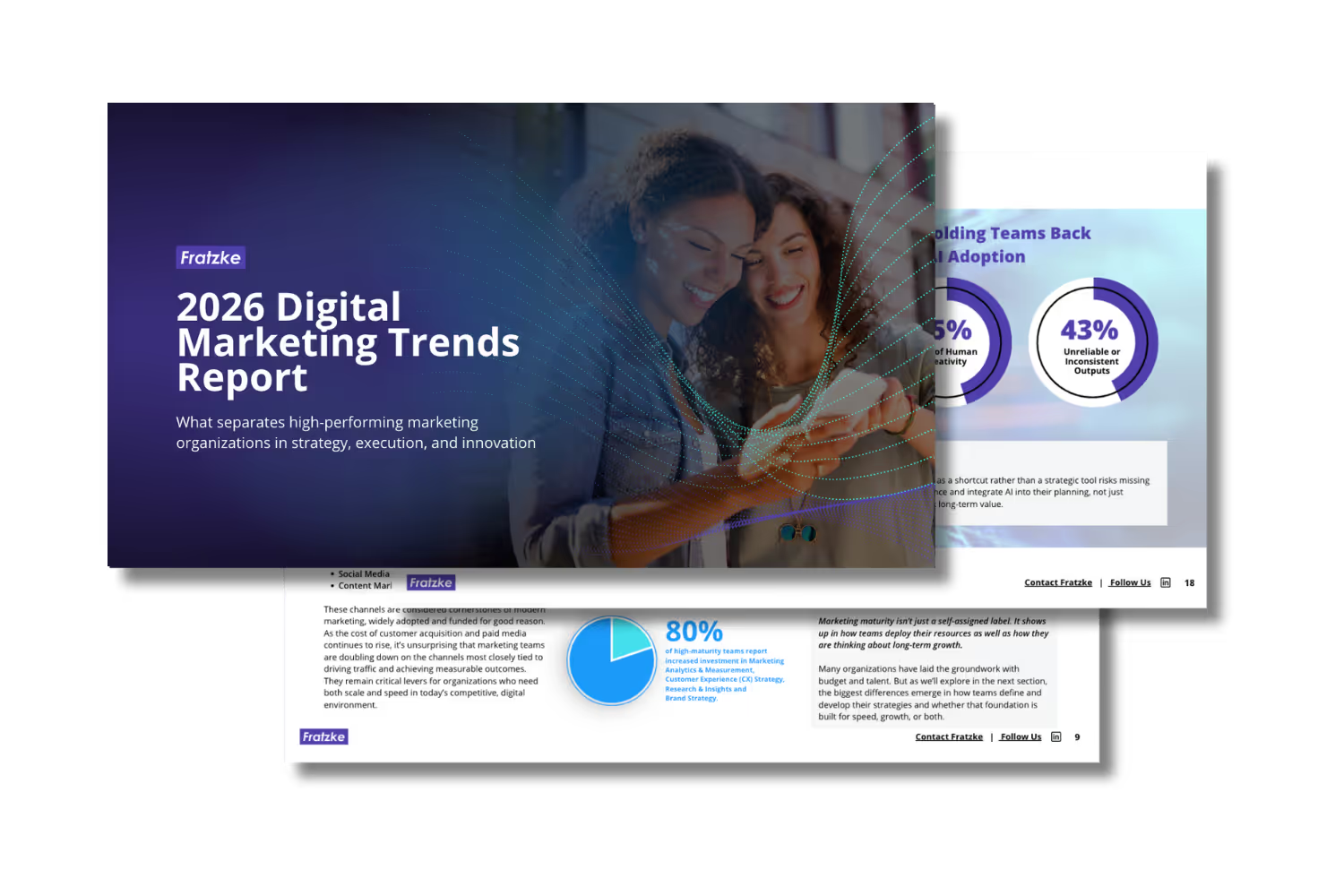Every marketing professional has experienced the struggle to justify marketing expenses. A boardroom meeting shouldn’t feel like you’re begging for donations to a worthy cause.
Thankfully, there’s a secret tool - that we wish wasn’t so secret - to help you develop a data-driven strategy that drives growth and identifies impactful opportunities to increase your return on investment (ROI).
Only 40% of marketing teams describe their strategy as very clear, a digital marketing audit can help your team gain clarity. Now, more than ever, it's crucial for organizations to consistently evaluate and refine their marketing strategies.
To help you get started, this article outlines what a digital marketing audit is, its significance in enhancing your marketing strategy, and a comprehensive approach to conducting your own digital audit.
Get Expert Help with Your Brand’s Digital Marketing Audit. Book a Free Consultation.
What is a Digital Marketing Audit?
A digital marketing audit involves looking at every aspect of your brand’s digital footprint. After completing one, you’ll have a 360-degree view of your brand packed with data-driven insights that you can leverage in your marketing strategy.
Having the results of a routine digital audit is like being dealt a Royal Flush in poker. It’s a game changer. And you don’t have to wait for a good hand to come your way – you can do this right now.
The audit, if done correctly, will help you measure the effectiveness of your marketing efforts, fine tune campaigns, and surface gaps or opportunities for your team to execute on.
Let’s take a look at the essential steps of a comprehensive digital marketing audit.
How to Run a Comprehensive Online Marketing Audit
Follow these steps to perform a digital marketing audit for your business.
- Review Your Website
- Audit Your SEO
- Generative Engine Optimization (GEO) Audit
- Perform a Content Marketing Audit
- Run a Social Media Marketing Audit
- Evaluate Paid Advertising Effectiveness
- Audit Your Brand’s Online Reputation
- Perform an Email Marketing Audit
- Analytics and Conversion Tracking Audit
A digital marketing audit will dive into each of these digital channels. Auditing each of these channels helps you understand how your customers prefer to be engaged and provide a holistic picture of your brand’s digital reach. Each channel has unique characteristics. But without performing a digital audit, you’re just throwing darts at the board – blindfolded.
Featured Research - 2026 Digital Marketing Trends Report - Download Now
1. Review Your Website
The first step of your digital marketing audit is to review your website.
Simply put, your website is the hub for all your digital marketing efforts. It is one of the only online assets that you have full control over. Here are the steps you will want to follow for your website audit.
Evaluate your website design
In the real world, your brick-and-mortar store window is designed to catch the eye of window shoppers passing by. In the digital world, your website should do the same thing.
Your website design is an important part of telling your brand story and significantly impacts your brand's perceived credibility.
In fact, 75% of your website's credibility comes from its design.
Here are some website design best practices you should audit on your site:
- Clear call-to-actions (CTA) - Your CTAs should stand out from other elements on your site. They need to be easy-to-find buttons, with colors that pop off the screen and inspire action. Strike the right balance and make sure not to overuse CTA buttons.
- Modern Design - Your site should look fresh, use plenty of white space to attract attention, and use images and videos that compliment the user experience.
- Website accessibility - Look for these 4 elements when auditing for website accessibility: color contrast, alternative text, visual focus indicators, and accessible labels.
- Clear Structure - Use consistent typography across your site. Use headings and subheadings with different text weights, colors, and sizes to lead users to the most important information.
- Easy to use navigation - Use your sites header navigation, footer, and other links, to help customers find what they are looking for in three clicks or less.

Check your website speed
Page load speeds are important for both the user experience and search engine rankings.
70% of consumers say that page speed impacts their willingness to buy from an online retailer. When it comes to load time, seconds count. According to research, website conversion rates drop by an average of 4.42% with each additional second of load time.
Audit your top performing pages to find ways to shave off every millisecond possible. Look for site-wide optimizations like:
- Compressing file sizes
- Reducing unused JavaScript
- Implementing lazy loading
A great tool for finding page speed optimizations and checking your site’s Core Web Vitals is Google’s PageSpeed Insights.
Make sure your site is mobile-friendly
Next, you should make sure that your mobile site experience is excellent. 58% of global website traffic comes from mobile devices (that doesn't include tablets).
Today's modern customer expects an easy-to-use mobile website. Mobile-friendliness is also a ranking factor for search engines. Custom website design and development can help ensure your site is pixel perfect on every screen.
Be sure to use tools like Google’s Mobile-Friendly Test and manually test your site using your smartphone. Here are some errors you want to avoid in order to ensure your site is mobile-friendly:
- Content wider than screen
- Viewport not set
- Text too small to read
- Clickable elements too close together
Related Resources:
- Website Design Trends and Strategies for Winning
- Understanding Web Accessibility - 4 Design Best Practices
- How to Perform a Website Audit to Boost SEO and Maximize Conversions
- 100 of the Best Website Designs to Inspire You in 2025 (A-Z)
- The Power of Custom Web Design to Increase Demand and Brand Awareness
- The Complete Guide to B2B Website Design
- What is Web Governance?
2. Audit Your SEO
Next you will need to conduct an SEO Audit. In simple terms, SEO helps your website rank higher on search engine results pages (SERPs) driving organic traffic to your website.
We all Google things every day, and auditing your site for SEO helps boost your website's ability to rank in the top three positions of the first page, where most of the clicks go.
The search algorithms are constantly changing, for this reason we recommend running an SEO audit on a regular basis, at least twice a year. When it comes to SEO, you can’t “set it and forget it” if you want to outperform your competitors.
Your SEO audit should be split into three sections: on-page SEO, off-page SEO, and technical SEO. Let’s review all three.

On-Page SEO Audit
On-page SEO is the process of optimizing your website's content and user experience in order to improve your page rank in SERPs. There are many on-page SEO ranking factors that send signals to search engines to help them understand what your content is about.
This helps search engines determine what keywords and search terms your content should appear for in SERPs and where they should be ranked.
If your site is optimized well for on-page SEO, you have a better chance of ranking higher in SERPs. Here are some of the most important on-page SEO factors to consider when auditing your website:
- Title and description
- Headings and formatting
- Content quality
- Internal linking
- Images with alt text
- Broken links
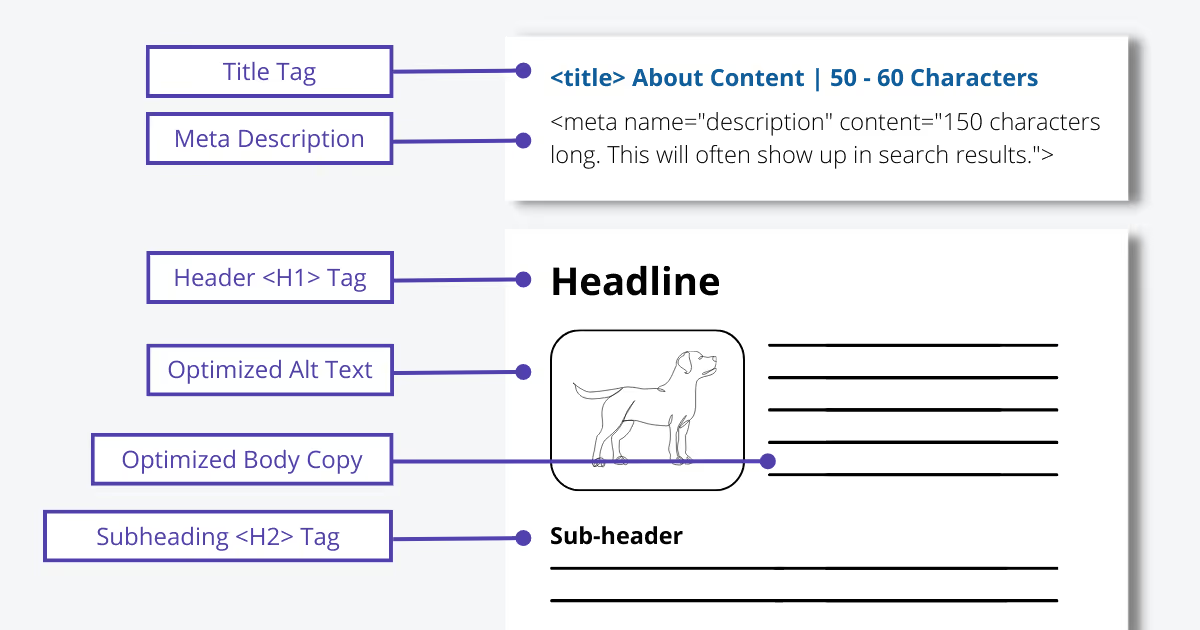
Off-Page SEO Audit
Off-page SEO refers to optimization tactics that can be used outside the boundaries of your own website, hence the name “off-page.”
Here’s how you can remember the difference between on-site and off-site SEO. On-site SEO is within your full control, since you own your website. Off-site is more difficult to control because you have to rely on other website’s for help.
One of the biggest off-page SEO tactics is to acquire backlinks, or link-building, from other authoritative websites. Since the beginning of search engines, backlinks have been a major ranking factor. When other sites link to your site it implies that they trust your brand and think your content is valuable. When auditing your website’s off-page SEO you want to consider:
- The quantity and quality of incoming links
- Your website’s Domain Authority
- Link profile relative to competitors
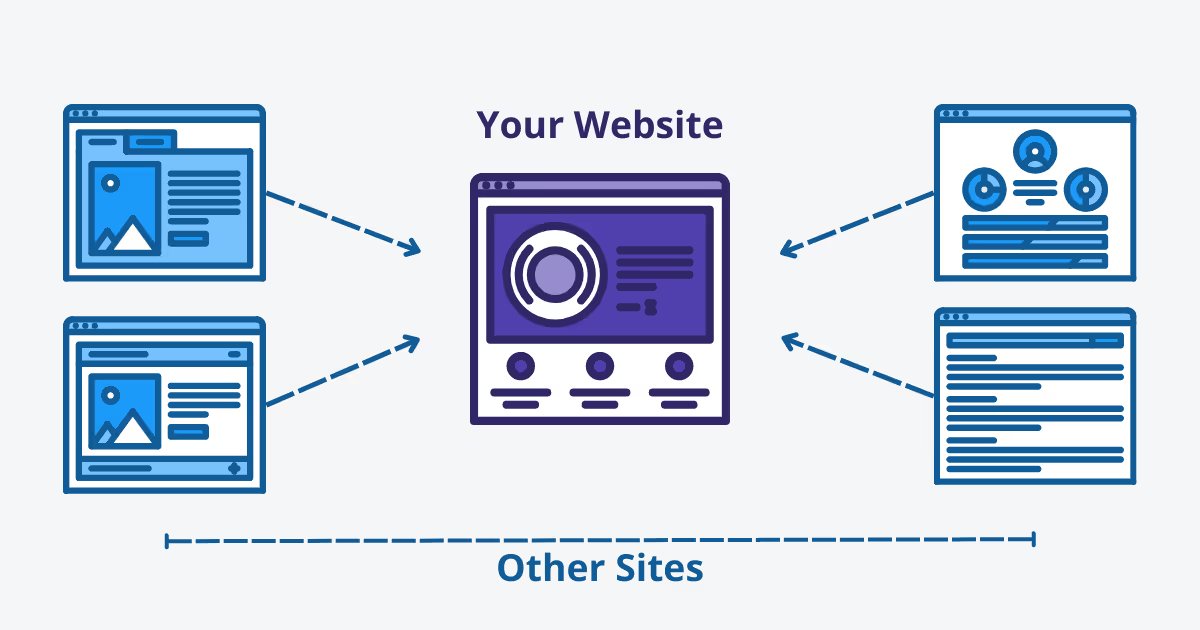
Technical SEO Audit
Technical SEO is the process of optimizing your site for search engine crawling and indexing. The main goal of technical SEO is to optimize the structure of your website and make it easy for Google and other search engines to find your content.
Here’s what you want look for in your technical SEO audit:
- Check your Robot.txt file to make sure you're not blocking any valuable content from being crawled
- Review your website’s URL structure to make sure it’s simple and intuitive
- Look for breadcrumbs on your website to add another layer of navigation
- Use structured data, when possible, to highlight key information for search engines
- Check your XML Sitemap to ensure it has all your pages included, and make sure it’s submitted to Google Search Console
- Make sure your site is secure with an SSL certificate and routes to HTTPS instead of HTTP
- Test your site speed to ensure it loads quickly, this is becoming a major ranking factor
- Ensure that your site is mobile-friendly, again, this is becoming a major ranking factor
Related Resources:
- SEO Consultant - Do You Need One and How to Hire
- SEO Audits: Your Guide to Better Rankings and Website Optimization
- Why Isn’t My Website Showing up on Google? 5 Answers.
3. Generative Engine Optimization (GEO) Audit
As generative AI reshapes how users discover information, Generative Engine Optimization (GEO) is becoming essential. Instead of focusing solely on traditional search engines, GEO aims to position your content as a trusted source within AI-generated answers and summaries.
Here’s what to include in a GEO-focused audit:
- Topical Authority - Deep, well-structured content that answers core and related questions
- Clear Formatting - Use headers, lists, and summaries to make content AI-readable
- Citations & Trust - Include author bios, references, and updated publish dates
- Structured Data - Use schema markup and clean HTML for better parsing
- E-E-A-T Signals - Highlight expertise, experience, and original insights
GEO KPIs
- Inclusion in AI-generated answers (manual check or tools like Serpstat AI)
- Featured snippet & People Also Ask (PAA) visibility
- Citation frequency by AI engine
- Topical keyword coverage & internal linking
- Engagement metrics (scroll depth, time on page)
As AI-driven tools like ChatGPT and Google SGE reshape search, GEO helps your content get sourced, cited, and surfaced in AI-generated answers.
4. Perform a Content Marketing Audit Marketing
After assessing your site's design and SEO performance, it’s time to audit your content.
Content marketing is the practice of creating useful content for your website that attracts and engages potential customers and helps build brand loyalty.
Find your best performing content
When conducting your content marketing audit, you want to start by pulling data for all your webpages and determine the best performing content. Here are the metrics you can use to test your content performance and engagement.
Content Performance Metrics
- Visitors – The number of people that have engaged with your site.
- Conversion Rate – What percentage of site visitors become customers?
- Opt-In Rate – Are visitors signing up for your email marketing?
- Traffic Sources – Where are your visitors coming from?
- Rate of Returning Visitors – How many people return after visiting your website?
- Duration of Visit – How long are they spending on each page of your site?
Look for common trends between top performing pages. Once you identify what’s working, and what's not, you can better optimize your content marketing strategy moving forward.
Map content to the customer's journey
When thinking about your content marketing strategy, it’s also helpful to sort content by which stage of the customer journey it helps support.
Customer Journey Stages:
- Awareness - The buyer is experiencing a problem or symptoms of a pain, and their goal is to alleviate it. They may be looking for informational resources to more clearly understand, frame, and give a name to their problem.
- Consideration - The buyer will have clearly defined and given a name to their problem, and they are committed to researching and understanding all of the available approaches and/or methods to solving the defined problem or opportunity.
- Decision - The buyer has decided on their solution, method, or approach. Their goal now is to compile a list of available vendors, make a short list, and ultimately make a final purchase decision.
- Loyalty - After a customer has made a purchase your goal is to keep them engaged and turn them into brand advocates.
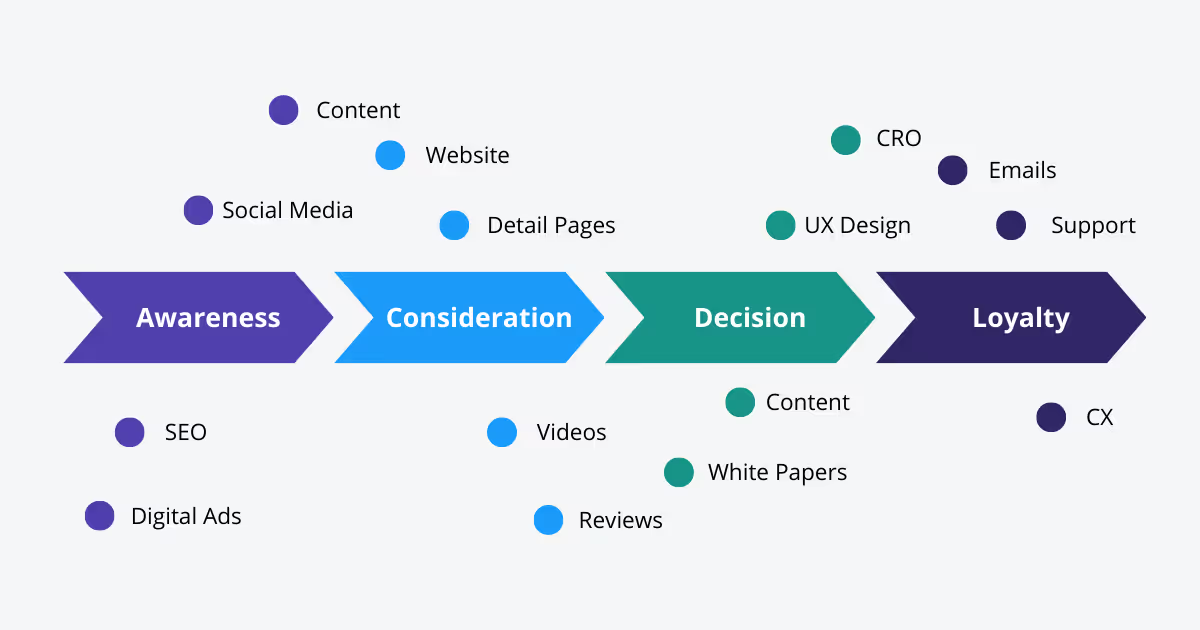
Remove, consolidate, or update pages
Once you’ve identified your top performing pages, it’s time to clean up and optimize your site. Consider removing poor performing content from your site. You can also combine similar content to help boost potential SEO value. In general, users and search engines would rather see one well developed page, than two with light content. When consolidating or removing pages, make sure to set up the proper 301 Redirects.
Create a content calendar
Use the insights you gained from your content marketing and SEO audit to create a content calendar for future content creation. Identify keyword gaps and create content based on your learnings from your top performing pages.
Related Resources:
5. Run a Social Media Marketing Audit
Now it’s time to run your social media audit. As part of this, you will want to review all of your social media profiles. Here are the areas you will want to focus on during your social media audit:
- Profile accuracy and brand consistency - Make sure all your social media have accurate information about your company, consistent use of your logo and brand in profile pictures and cover photos, and updated bios and links.
- Follower and audience growth - Chart your follower growth over time to ensure you are seeing healthy growth month over month.
- Engagement rates - Calculate your engagement rates for your posts, identify trends with your most engaging content, and plan to create more content that matches your most popular posts.
- Identify your best post types - When you calculate your engagement rate, look at what post types perform best like video, carousels, status updates, and others.
- Activity relative to competitors - Review how often you post on social media relative to your competition. If you notice that more or less activity yields more engagement, and adjust accordingly.

Based on your social media audit findings, you can create an action plan for next steps. For example, if you find that one social media platform is performing better than another you may consider investing more time on the higher performing channels.
Explore new social media platforms
During your social media audit it’s important to explore new and emerging platforms. Conduct a competitive benchmark audit to determine if any of your competitors are on lesser known or trending platforms. Consider testing content on these platforms.
If you're looking to target a specific audience, make sure to do your research to understand what platforms might work best.
Related Resources:
- The Rise of the Social CEO - Executive Communications
- How to Conduct a Social Media Audit: A Step-by-Step Guide
Influencer Marketing Audit
An influencer marketing audit evaluates the performance, alignment, and ROI of your influencer partnerships. It reviews key metrics like engagement rates, follower authenticity, content quality, brand fit, and campaign outcomes. The goal is to ensure your influencer strategy is driving real value, by reaching the right audience, generating trust, and contributing to conversions or brand awareness.
6. Evaluate Paid Advertising Effectiveness
Now it’s time to review your paid advertising campaigns with a digital advertising audit. You may be spreading your budget across a variety of platforms like Google Search or Instagram, regardless of the platform, here are the areas you should review in your audit.
Review your campaign budget and goals
You want to review your advertising budget at least quarterly to ensure that it’s being spent efficiently. Look for campaigns that have higher budget spends, but fewer conversions.
Conversions are when your ad campaigns meet their goals. Advertising campaign goal examples include:
- Awareness - Build brand awareness with new and existing customers
- Traffic - Drive potential customers to your website
- Engagement - Increase engagement on your content or social posts
- Leads - Collect leads for your business via form fills
- App promotion - Promote your app and encourage downloads
- Sales - Increase sales on your website or ecommerce store
Analyze performance data
In order to check your advertising campaigns’ performance, audit the following metrics. Identify trends, and update accordingly.
- Reach / Impressions - How many people saw your advertisement?
- Cost - How much did you spend for your ad campaigns?
- Clicks - How many people clicked on your advertisements?
- Cost per click (CPC) - How much did you pay for each click?
- Click-through rate (CTR) - What percentage of people who saw your ads clicked on them?
- Actions / Conversions - How many people complete the action or goal you intended them to take?
- Cost per action (CPA) - How much did you spend for each action taken?
- Conversion rate (%) - What percentage of people who interacted with your advertisement took the desired action you wanted them to take?
Check your ads
The last step of your advertising audit is to review your actual ads. There are several areas you want to focus on. Remember to use the insights you gained from your budget, goal, and performance analysis. Here are the key elements to review for your advertisements.
- Headline and Message
- Target Audience
- Keywords
- Creative Assets
- Display URL
- Call-to-action (CTA)
Auditing your media mix
A media mix audit helps you assess how effectively your advertising budget is distributed across media channels and whether each one is delivering results. It ensures you're not overspending on underperforming platforms or missing opportunities in high-ROI areas. Your review may include these media types:
- Search (SEM) – Google/Bing ads targeting keyword intent; assess CPC, CTR, and conversions
- Social Media Ads – Meta, LinkedIn, TikTok; review audience targeting, engagement, and ROAS
- Display Ads – Banner ads across websites; evaluate impressions, click-throughs, and viewability
- Connected TV (CTV) – Video ads on streaming platforms like Hulu and Roku; track reach and completion rates
- Video (YouTube/Short-Form) – Measure engagement and watch-through rates on video campaigns
7. Audit your Brand’s Online Reputation
An Online Reputation Audit helps you better understand what customers are saying about your brand online.
According to research from BrightLocal, 79% of consumers say they trust the reviews they read online as much as a personal recommendation. As a result, understanding your brand's online reputation is very important.
When conducting your reputation audit, make sure to complete a full review of any platforms that may have reviews about your business, including:
- Customer review sites - Google, Yelp, Better Business Bureau (BBB), and Trust Pilot
- Employee-focused platforms - Glassdoor, LinkedIn, and Indeed
- Online courts of public opinion - Google Search, Facebook, and Twitter
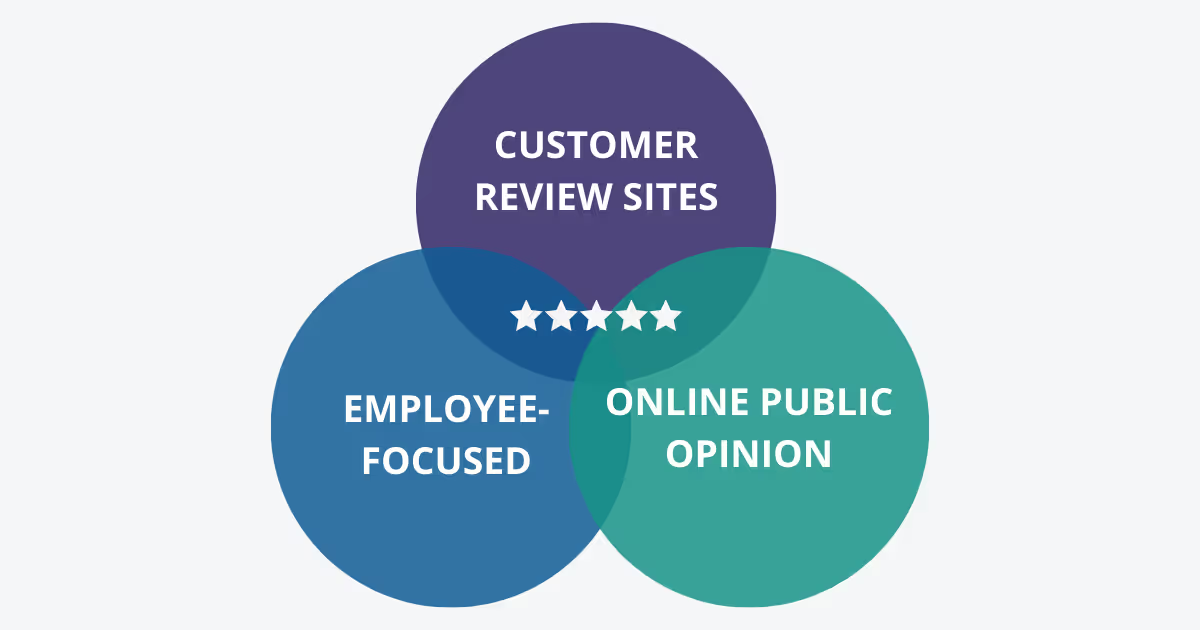
Responding to negative reviews
Even when your company receives a negative review, it’s important to respond authentically and try to resolve the issue. This sends a signal to both consumers and search algorithms that your brand is engaged and puts customers first.
8. Perform an Email Marketing Audit
We made it to the last step of your digital marketing audit! It’s time to perform your email marketing audit.
Email is one of the oldest and time-tested digital marketing channels - and it is still relevant today. Here are the most important metrics you want to audit as part of your email marketing review.
Email performance metrics
- Delivery rate - How many sent emails were successfully delivered?
- Open rate - How many people opened your email?
- Click-through rate (CTR) - How many people clicked on a link in your email?
- Conversion rate - How many people took the desired action from your email campaign?
Audience health
Another important area to inspect is your subscriber list or audience health.
- Audience size - How large is your audience?
- Subscription rate - How many people are subscribed to your email list?
- List growth rate - At what rate is your audience growing or shrinking?
- Unsubscribe rate - What percentage of people are unsubscribing from your list?
- Audience engagement - How many people are opening and clicking through your email campaigns?
Keep in mind that losing subscribers or cleaning your list is not always a bad thing. You want to make sure your audience contains high-quality subscribers.
Consider removing subscribers who are inactive and emails that don’t get delivered. This can help increase your overall engagement.
Email design
The last part of your email marketing audit is to review your actual email designs.
- Are they mobile-friendly?
- Do they include an unsubscribe button?
- Does it have clean, easy-to-understand formatting?
- Is the value proposition clear?
- Do they have a clear call-to-action?
- Are the subject lines eye-catching?
- Are the designs consistent with your brand and profession?

Analytics and Conversion Tracking Audit
A digital strategy is only as good as the data behind it. An analytics and conversion tracking audit ensures you're capturing accurate, actionable insights to guide decision-making and measure ROI.
Key Areas to Check:
- Analytics Setup - Is GA4 or your tracking platform properly installed and error-free?
- Conversion Events - Are key actions (forms, sales, sign-ups) being tracked correctly?
- Attribution - Are conversions assigned accurately across channels?
- Funnel Tracking - Can you see where users drop off in the journey?
- Privacy & Compliance - Is data collection compliant with GDPR/CCPA and consent properly handled?
A clean, well-structured analytics setup gives you the insights you need to improve and grow.
New Research - The 2026 Brand Strategy Playbook - Download Now
Do I Need to Complete a Digital Marketing Audit?
Whether you’re a seasoned marketing executive, or a growing company that is just starting to think about their digital footprint, these questions will help you decide if a digital audit is right for you:
- Do you have a comprehensive digital marketing strategy for growing your brand?
- Are you experiencing consistent, double-digit percentage growth in online engagement with your brand?
- Do you have an effective operations strategy with the right People, Platforms, Partners and Processes in place to set your brand up for success?
- Are you ranking above your competitors in Google’s search results for queries related to your products and services?
- Are you measuring your Key Performance Indicators and tracking the right data to generate the most engagement with your target audience?
This isn’t a comprehensive list, but if you’ve answered “no” to just two or three of these questions, it’s time to perform a digital audit.
Marketing Shouldn’t Be a Game of Chance
Once you can answer the questions above, you’ll be able to focus on the things that will deliver the biggest impact to your company’s bottom-line. Instead of chasing your competitors in the marketing equivalent of “monkey see, monkey do,” you can identify the metrics and opportunities that matter most for growing your digital footprint.
Why Is Understanding Your Digital Marketing Data Important?
Numbers tell a story. When you come to the table with competitive insights, emerging trends and engagement statistics, you’re ready to handle virtually any obstacle that comes your way.
This data really is a win-win for marketers trying to justify their marketing budget. You can convince stakeholders to approve radical strategic changes based on your performance and business owners can better identify their next steps. In the areas where you are weakest, you can more effectively communicate a sense of urgency and identify opportunities for growth.
And, of course, the areas where you are strongest will serve as justification that what you are doing is making a difference. Once enough of these numbers are in the right place, you will be able to point to a growth in revenue, user engagement and brand recognition.
Related Resources:
- Digital Marketing Strategy: Keep It Simple
- Recession Proof Marketing Strategies for Your Business
- 5 Ps of Marketing - Marketing Mix Strategic Framework
- Digital Marketing Benchmarks & KPIs - How To Compare Your Performance
- Digital Maturity Assessment: Is Your Brand a Leader or Laggard?
- Fractional CMO: What is it and Why Your Brand May Need One
- Marketing Audit - What is an Audit and How to Do One
- How to Create Customer Surveys: 8 Tips & 25 Sample Questions
- Market Research: The Ultimate Guide, Benefits and Examples





